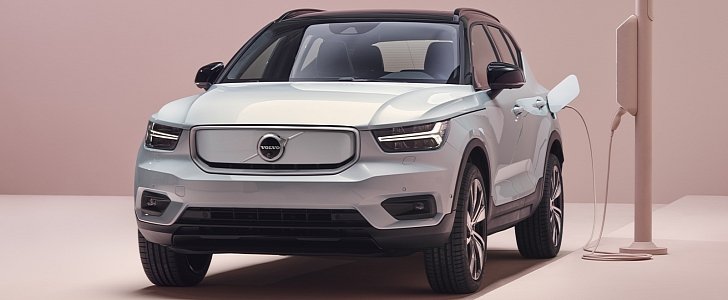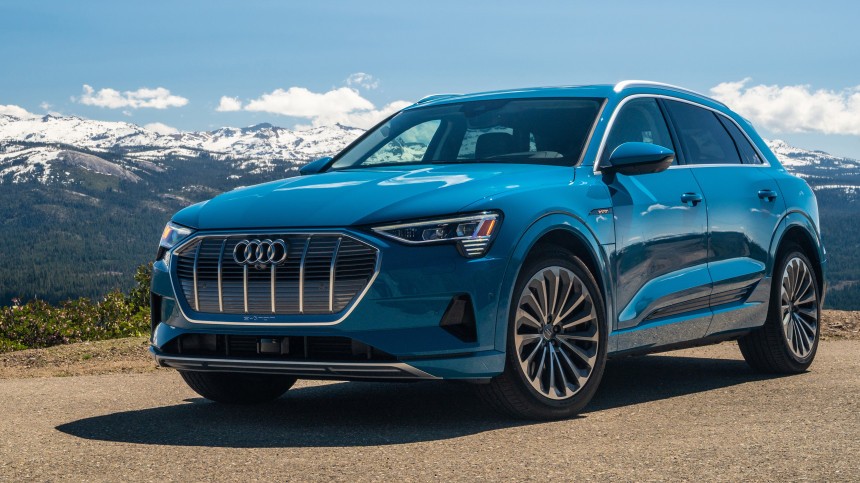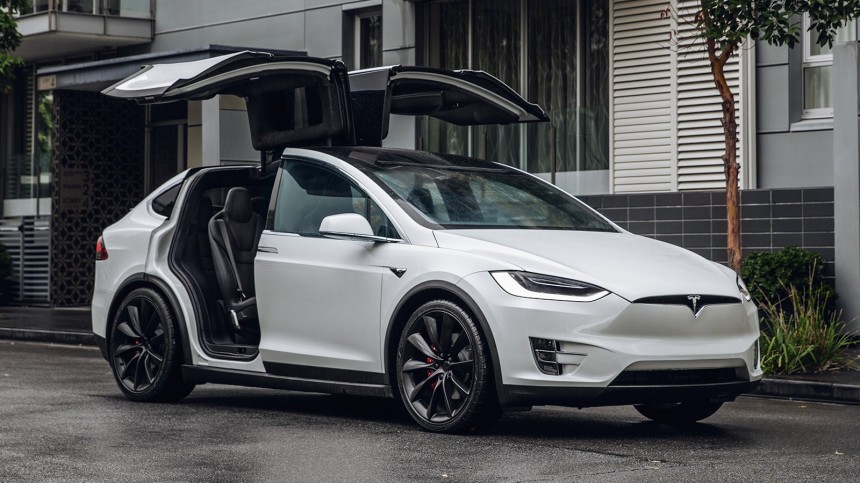When automakers set out to make an electric vehicle, they should try to seek out as much range as possbile out of that vehicle’s battery pack. They should strive (at least in theory) to make it as efficient as is humanly possible, given the current technological constraints (and the unbendable laws of physics).
However, they still need to sell their (electric) vehicles to actual car buyers, and the car buying public is going crazy for SUVs right now. So what are the automakers doing? Why they’re making their electric vehicles SUVs, of course.
Things have become so ridiculous that even most of the new electric vehicles launched in the last couple of years are SUVs. Manufacturers are trying to take advantage of SUV popularity to also sell EVs and while this may make sense for all the bean counters in their marketing and planning departments, when you stop to think about it, it kind of defeats the purpose of trying to make the greenest cars possible.
Sure, an all-electric SUV doesn’t have tailpipe emissions, but it uses up its juice quicker than if the same powertrain and battery pack were fitted to a regular sedan or hatchback. That seems a bit daft to me and while I do understand why it’s a thing, I can’t be okay with it. At first it was a trickle of high-riding EVs, but it’s really turning into deluge of biblical proportions.
Don’t believe me? Check out how many SUV (and crossover) EVs have gone on sale in the last few years, plus the ones that are on the verge of being launched. It’s all mad and it has much more to do with manufacturers’ profit margins than it does with saving the planet.
Tesla was the first manufacturer to launch a fully electric, series production SUV, in the form of the Model X. It wasn’t the automaker’s first model, though, as it began selling the Model S before the X. The Model X is quite expensive, though, and maybe a bit too big for some buyers’ needs, which is why the company also launched the Model Y (it’s been revealed, but Tesla only expects deliveries to start in the fall of 2020).
Jaguar’s first all-electric vehicle is, you guessed it, a high rider: the Jaguar I-Pace isn’t really an SUV, more of a crossover/quirkily styled high-riding hatchback/fastback, but it was clearly made taller than regular cars in order to woo the crossover hungry public its way. The I-Pace is a genuinely good car, though, and it’s actually quite energy efficient for what it is.
Mercedes’ also went with an SUV as its first production all-electric model, the EQC, which is essentially a battery-powered version of the GLC SUV with some minor styling changes to make it easy to tell apart. The Three Pointed Star’s next all-electric offering will be yet another SUV, this time an EV version of the smaller GLB, which will be called the EQB.
Audi has been showing off close-to-production EV concepts for the last few years, but its first actual production EV was, you guessed it, an SUV. Simply called the Audi e-tron, it rides on the VW group MLBevo platform that underpins most of Audi’s larger models. The next all-electric Audi will be an electric version of the China-only Q2 L which may or may not end up being sold in Europe (it could be China-only).
Volkswagen’s first electric car wasn’t an SUV, but a battery-powered version of the Golf (called the e-Golf) which it launched in 2015. However, that car doesn’t have the highest range (the original was rated by the EPA in the U.S. for only 134 km / 83 miles) and it wasn’t a huge seller. The automaker is hoping to make a much bigger splash on the EV market with its next offering, this time built atop a dedicated EV platform called MEB, a production version of the I.D. Crozz concept.
It needs to be said, though, that it will be preceded to market by the ID.3 all-electric hatchback whose series production is expected to commence by the end of 2019, so at least VW is bucking the trend of making its first EVs SUVs.
You can already order the BMW iX3, even though it hasn’t actually been shown in full production guise. It is, as you probably already figured out, an all-electric version of the BMW X3 and it’s the brand’s first EV SUV, although it’s actually the second series electric vehicle, after the talented and quite popular i3.
Volvo’s first EV sold under its own brand is, unsurprisingly, the XC40 Recharge. It’s obviously just a version of the XC40 that no longer has an internal combustion engine, having been replaced by a pair of electric motors with over 400 horsepower and a 75 kWh battery pack. The Swedish automaker (owned by China’s Geely since 2010) will continue to electrify other models in its range, but like many automakers, it chose to go down the EV SUV road with its first electric model.
Ford did sell the Focus Electric for a while, but with its ridiculously low range, it was not really an attractive buy. For its second mass market EV, though, the Blue Oval is putting all its eggs in a high-riding, Mustang-inspired basket. Yes, that’s right, the EV that Ford wants to make a big impression with is going to be a sporty SUV with Mustang cues. Oh joy, that’s exactly what we needed, isn’t it?
Not to be outdone by its competitors, Hyundai chose for its first EV to be a crossover, albeit a fairly small and quite efficient one (compared to the much larger models sold by competitors), the Kona Electric. The Kona itself isn’t really one of the obnoxious high riders out there, since it genuinely looks like and feels a slightly taller hatchback, and it’s actually a very accomplished vehicle. It’s not quite as efficient as the all-electric version of Hyundai’s Ioniq, but it’s actually very close.
Basically, most manufacturers that started selling EVs recently have gone down the EV SUV path and those that don’t either planned such a vehicle as their second electric model or are working on one. And while it’s totally okay to be on-board with electric vehicles these days, you shouldn’t really support the idea of electric SUVs because it’s a rolling contradiction.
Things have become so ridiculous that even most of the new electric vehicles launched in the last couple of years are SUVs. Manufacturers are trying to take advantage of SUV popularity to also sell EVs and while this may make sense for all the bean counters in their marketing and planning departments, when you stop to think about it, it kind of defeats the purpose of trying to make the greenest cars possible.
Sure, an all-electric SUV doesn’t have tailpipe emissions, but it uses up its juice quicker than if the same powertrain and battery pack were fitted to a regular sedan or hatchback. That seems a bit daft to me and while I do understand why it’s a thing, I can’t be okay with it. At first it was a trickle of high-riding EVs, but it’s really turning into deluge of biblical proportions.
Don’t believe me? Check out how many SUV (and crossover) EVs have gone on sale in the last few years, plus the ones that are on the verge of being launched. It’s all mad and it has much more to do with manufacturers’ profit margins than it does with saving the planet.
Jaguar’s first all-electric vehicle is, you guessed it, a high rider: the Jaguar I-Pace isn’t really an SUV, more of a crossover/quirkily styled high-riding hatchback/fastback, but it was clearly made taller than regular cars in order to woo the crossover hungry public its way. The I-Pace is a genuinely good car, though, and it’s actually quite energy efficient for what it is.
Mercedes’ also went with an SUV as its first production all-electric model, the EQC, which is essentially a battery-powered version of the GLC SUV with some minor styling changes to make it easy to tell apart. The Three Pointed Star’s next all-electric offering will be yet another SUV, this time an EV version of the smaller GLB, which will be called the EQB.
Audi has been showing off close-to-production EV concepts for the last few years, but its first actual production EV was, you guessed it, an SUV. Simply called the Audi e-tron, it rides on the VW group MLBevo platform that underpins most of Audi’s larger models. The next all-electric Audi will be an electric version of the China-only Q2 L which may or may not end up being sold in Europe (it could be China-only).
Volkswagen’s first electric car wasn’t an SUV, but a battery-powered version of the Golf (called the e-Golf) which it launched in 2015. However, that car doesn’t have the highest range (the original was rated by the EPA in the U.S. for only 134 km / 83 miles) and it wasn’t a huge seller. The automaker is hoping to make a much bigger splash on the EV market with its next offering, this time built atop a dedicated EV platform called MEB, a production version of the I.D. Crozz concept.
It needs to be said, though, that it will be preceded to market by the ID.3 all-electric hatchback whose series production is expected to commence by the end of 2019, so at least VW is bucking the trend of making its first EVs SUVs.
Volvo’s first EV sold under its own brand is, unsurprisingly, the XC40 Recharge. It’s obviously just a version of the XC40 that no longer has an internal combustion engine, having been replaced by a pair of electric motors with over 400 horsepower and a 75 kWh battery pack. The Swedish automaker (owned by China’s Geely since 2010) will continue to electrify other models in its range, but like many automakers, it chose to go down the EV SUV road with its first electric model.
Ford did sell the Focus Electric for a while, but with its ridiculously low range, it was not really an attractive buy. For its second mass market EV, though, the Blue Oval is putting all its eggs in a high-riding, Mustang-inspired basket. Yes, that’s right, the EV that Ford wants to make a big impression with is going to be a sporty SUV with Mustang cues. Oh joy, that’s exactly what we needed, isn’t it?
Not to be outdone by its competitors, Hyundai chose for its first EV to be a crossover, albeit a fairly small and quite efficient one (compared to the much larger models sold by competitors), the Kona Electric. The Kona itself isn’t really one of the obnoxious high riders out there, since it genuinely looks like and feels a slightly taller hatchback, and it’s actually a very accomplished vehicle. It’s not quite as efficient as the all-electric version of Hyundai’s Ioniq, but it’s actually very close.
Basically, most manufacturers that started selling EVs recently have gone down the EV SUV path and those that don’t either planned such a vehicle as their second electric model or are working on one. And while it’s totally okay to be on-board with electric vehicles these days, you shouldn’t really support the idea of electric SUVs because it’s a rolling contradiction.









